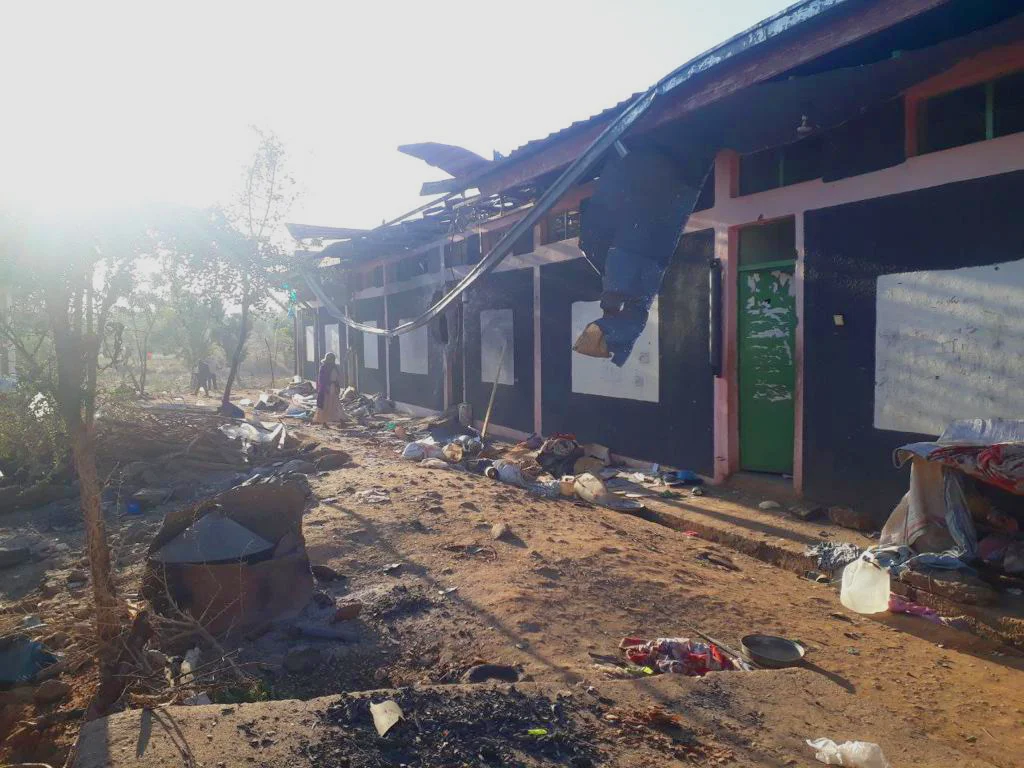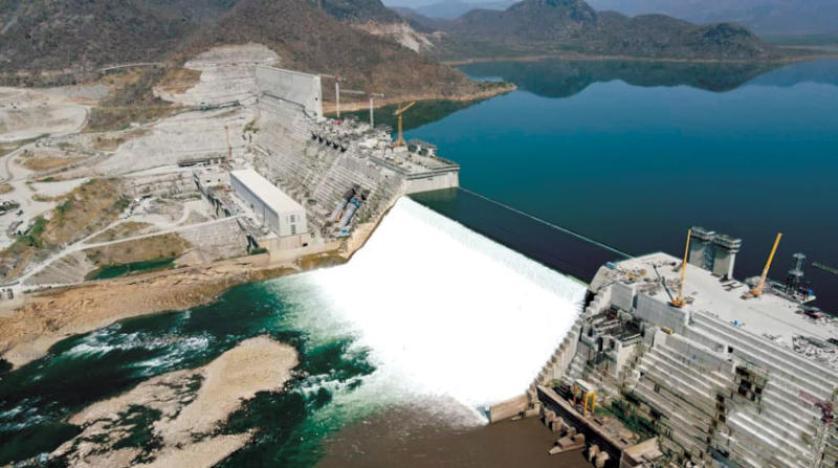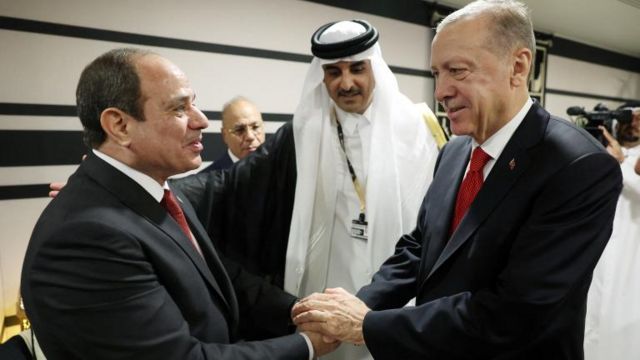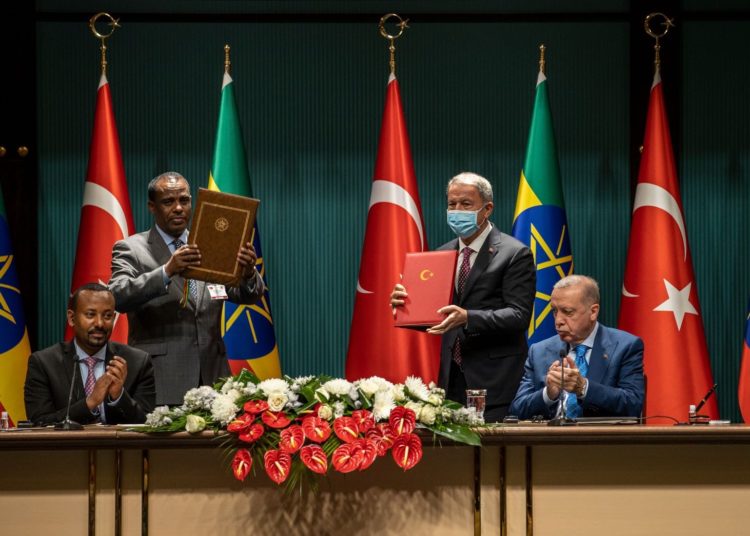Levent Kenez /Stockholm
The Turkish government has submitted a military agreement signed with Ethiopia in 2021 to parliament for approval. The agreement, which was given a green light by parliament’s Foreign Affairs Committee on Tuesday, aims to improve military relations and intelligence sharing with Ethiopia. Opposition lawmakers saw the step for ratification of the agreement as an inconsistency in the government’s foreign policy at a time when Ethiopia and Egypt are involved in a dispute over the construction of a dam on the Nile, considering that Turkey has been trying to repair relations with Egypt.
During an official visit of Ethiopian Prime Minister Abiy Ahmed to Ankara on August 18, 2021, three separate agreements were signed by the defense ministries –the Financial Contribution Implementation Protocol, the Military Financial Cooperation Agreement and the Military Framework Agreement, the last of which was the first to be submitted to parliament.
The areas of cooperation in the agreement are listed as joint participation in military exercises and non-combat operations such as peacekeeping, humanitarian aid and counter-piracy operations. The agreement also allows the two countries to cooperate in the defense industry.
According to Article IV(6) of the agreement, the parties also agree to share military intelligence. Moreover, the parties will provide mutual logistical support and exchange munitions, materials and services in the form of grants or in return for payment.
An article on the protection of classified information and physical and intellectual property rights generally included in agreements on cooperation in the defense industry that Turkey has signed with countries to which it plans to sell weapons is also included in the framework agreement with Ethiopia.
Minutes of the discussion in the parliamentary committee on the military agreement with Ethiopia:
The Ethiopian side has completed the ratification of the agreement.
İYİ (Good) Party deputy and retired diplomat Ahmet Kamil Erozan claimed that Turkey had serious problems with Egypt at the time the agreement was signed and that now is not the right time to ratify it. Stating that there is no coordination between the Ministry of Foreign Affairs and the Ministry of Defense, Erozan said ratification of the agreement would annoy Egyptian President Abdel Fattah el-Sisi.
However, Deputy Foreign Minister Faruk Kaymakçı stated that the agreement was not targeting any third country, adding that similar standard agreements have been signed with 86 countries so far.

Turkish-Ethiopian military relations came to the international agenda after the Ethiopian army on January 7, 2022, hit a primary school building filled with children, women and elderly men with drones bought from Turkey. At least 59 civilians were killed in the attack, and dozens more were injured. Up until that time, Turkey was not known to have sold drones to Ethiopia. Weapons remnants recovered from the site were determined to be MAM-L (smart micro munition) guided bombs produced by Turkey’s Roketsan and paired exclusively with Turkish-made Bayraktar drones.
Noting that weapons Turkey had exported to Ethiopia were delivered to the legitimate government, Kaymakçı claimed that the regulations were complied with as to who the end user was. But he did not respond to allegations about the use of these weapons against civilians.
Lawmakers also claimed that the Turkish Embassy was moved to Kenya when Tigrayan militants announced they would target it after the bloody attack, but Kaymakçı said at the committee meeting on Tuesday that only the ambassador, not the embassy, had temporarily left Ethiopia over security concerns.
Egypt and Sudan are in a dispute with Ethiopia over the nearly finished Grand Ethiopian Renaissance Dam being built on the Nile River. Egypt is worried about a decrease in water in the Nile River, from which it meets almost all of its drinking water and irrigation needs. Although the three countries intend to come together and negotiate a solution to the problem, they have not been able to establish a mechanism to produce a concrete solution so far.

Visiting Washington for a US-Africa summit Egyptian President el-Sisi on Wednesday sought US help in pressing Ethiopia into an agreement on the mega-dam during his meeting with US Secretary of State Antony Blinken, who had met a day earlier with Ethiopian Prime Minister Abiy Ahmed.
For some time now the government of Turkish President Recep Tayyip Erdoğan has been trying to repair uneasy relations with Egypt. Turkey experienced serious problems with Sisi’s Egypt over the support it gave to the Islamist Muslim Brotherhood, which Erdoğan sees as ideologically close to him. Turkey and Egypt also support two rival groups in Libya, both of which claim to represent the only legitimate government.
However, when Erdoğan’s policies resulted in Turkey’s isolation in the Islamic world, Turkey started negotiations to woo Egypt and Saudi Arabia, which demanded that Turkey take concrete steps to address their concerns. Turkey first asked TV stations affiliated with the Muslim Brotherhood that broadcast from Istanbul to dial down their rhetoric.
In March 2021 Turkish Foreign Minister Mevlüt Çavuşoğlu announced that diplomatic negotiations with Egypt had begun without preconditions. It was rumored by the Turkish media that the Egyptian delegation conveyed the message that it was in Turkey’s hands to ensure the development of the talks, implying the need for concrete steps from Turkey.

Erdoğan greeted and shook hands with el-Sisi at the opening of the World Cup in the Qatari capital of Doha on November 20. The friendly handshake was considered an important step in the ongoing process of normalization between the two countries.
Speaking to reporters on his return from Qatar, Erdoğan said, “The togetherness of the Turkish nation and the Egyptian people in the past is very important to us. Why not start over? We gave them the signal.”
Bringing the military agreement with Ethiopia just now to the parliament could also be seen as a message against Egypt’s increasing cooperation with Greece in the eastern Mediterranean.












